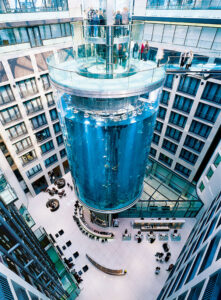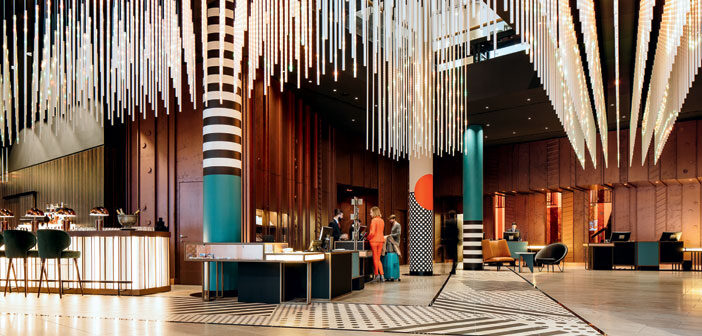Hotels in Germany, like in the rest of the world, felt the brunt of the pandemic as occupancies fell drastically due to travel restrictions. But, visitors returned once they were lifted, and properties have seen improved performance as the months have progressed.
Take Berlin as an example. According to preliminary data from STR, the German capital city last month reported occupancy of 78.6%, which was less than one percentage point lower than July 2019. ADR, which came in at 111.85 euros ($115.74), was more than 24 euros ($24.85) higher than the same month in 2019. RevPAR was 87.94 euros ($91.05).

Union Investment Real Estate GmbH’s investments in Germany include Pullman Berlin Schweizerhof and Radisson Blu Hotel, Berlin.
However, it took some time to get to this point. At the height of the crisis, as many as 61% of hotels in major German cities closed their doors for a period of time, according to OTA Insight. But, once restrictions were lifted in May 2020 to allow hotels to open, “drive-to resort destinations did surprisingly well and could directly beat 2019 performance during that period,” said Andreas Loecher, head of department investment management hospitality, Union Investment Real Estate GmbH, a Hamburg-based real estate investment company.
While leisure travel came back first, similar the U.S., business travel has lagged behind.
“Locations with a business focus have still not fully recovered, particularly the ones dependent on international arrival, such as Frankfurt,” said Loecher. “We would expect such markets not to fully recover before 2025. Other markets with a more balanced business/leisure mix are expected to recover at a much faster pace. This applies to Hamburg, for example, which also benefits from a strong domestic demand.”
Economy hotels—which, Loecher noted, were already successful prior to COVID-19—have performed well since travel was restarted.
“Their main advantage is the comparably affordable rate for the guest,” he said. “Many of those concepts really have experienced a [refreshing], offering a new experience. They are also quite cost-efficient. GOP [gross operating profit]percentages are higher. Such products are more resilient in a decline of revenue [period], and operations can relatively quickly be adopted to the changing environment.”
Secondary markets in Germany have been, as Loechler called them, the “hidden champions” because “[their]dependence on international demand is significantly lower than in German [major]cities. Domestically generated demand has proven to be an anchor of stability for many secondary cities.” Resort destinations in secondary cities are actually benefiting from climate change, he noted, as “the Baltic and North Sea [now have]more stable weather conditions.”
Two of the biggest issues the industry faces—labor and inflation—are also affecting German hotels.
“The challenges for the German hotel industry are absolutely comparable to those you face in the U.S. as 20-25% of employees in hotel operation have turned their back to the industry,” said Loecher. “Currently, some of the Ukrainian refugees may help and could be attracted to the industry. Our industry is in heavy competition with other industries, and the working hours are not always the best. Hence, not only a fair and friendly atmosphere is key, but also an appropriate compensation and attractive employee incentives.”
He added, “Another factor is rising utility and energy costs. There is a great uncertainty on the coverage of gas from Russia at the moment, for example. This is a topic that currently poses far more risks for the domestic hotel industry than the pandemic, which has been largely brought under control here in Germany. The impact on margins is very hard to predict at this point of time.”
Loecher pointed out the hotel investment market has been sluggish due to uncertainties triggered by the war in Ukraine.
“No major transactions have taken place in recent months,” he said. “We have seen some smaller transactions taking place in the periphery and tertiary locations with some discounts.”
Union Investment has recently made a number of investments in Germany, Loecher said, “including a hotel in Rostock, which is one of the stronger secondary locations in Germany. Also, we invested in a hotel development in Stuttgart—an Adina and Premier Inn complex.”
Other companies have also recently invested in hotels in Germany. A joint venture between entrepreneur Eckhard Brockhoff and real estate group Soravia purchased the Hotel Bredeney in Essen; German real estate investor Real I.S. acquired two hotels in the German city of Stuttgart under the Hampton by Hilton and Premier Inn brands; and Ampega Investment, part of Talanx Group (Germany’s third largest insurance group) has purchased the me and all hotel in Dusseldorf.
While there haven’t been many major hotel transactions in Germany, the construction pipeline stands as the largest in Europe in total rooms (more than 40,700), according to STR.


